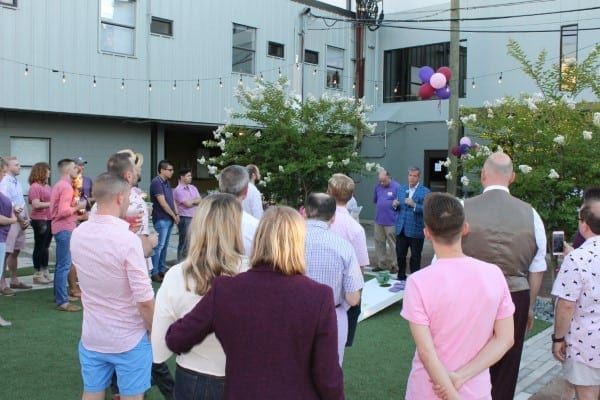by Elyce Rae Helford
Contributor
Queerness is an integral part of the community theater experience. From gay actors to genderbent characters to the queer excess of genres such as melodrama and musical comedy, my pleasure in the local community theater scene is a thoroughly queer one. And for me, that is an important cultural, social and even political pleasure.
I hope the following discussion offers familiar queer delights for readers who have worked and played in this magical little world of inadequate funding, cramped schedules and less-than-ideal venues. And I hope it offers inspiration to join in the wonderful queer madness for those who have not (yet).
The most superficial and obvious queerness in community theater is, of course, the queers. I haven’t done a show yet without meeting familiar and new middle Tennessee gay men, bisexual women and other queer-identified individuals.
A particular treat is when some poor unsuspecting soul of homophobic persuasion assumes that this “wholesome” activity of “putting on a show” (and they’re usually in the Christmas shows or other “family fare”) means that everyone in the cast and crew is going to be straight as an arrow.
In a recent musical, a 50-something community theater newbie and happy member of the ensemble approached the lead to comment on what a truly nice man he was, and asked if he was married. Presumably, she was going to fix him up. He responded that yes, he was; he’d been with his husband for 15 years. Her mouth dropped open and stayed that way. The actor quickly followed up: “Have I made you uncomfortable?” And the rest of the show became an eye-opening shockfest for our new friend, as she discovered just where assumptions like that get a person, and just how surrounded she was by not only out-gay men but by queer sympathists all around. Our “we’re all in this together” team spirit as a cast and crew took her along for the ride and gave her new things to think about in her broadening world.
Gender-bending characters are another exciting part of community theater, and they abound. From the women disguised as men in Shakespeare favorites like Twelfth Night and As You Like It to the cross-gender casting that often happens because it is often so much easier to find women for shows than men. What happens when you don’t have enough adult men to cast Bert and Ernie of It’s a Wonderful Life (the cop and the postman) as males? You get Bert and Ernestine, of course, and watching them play drinking buddies decrying the wives they’ve left at home on Christmas Eve is absolutely delightful.
Moreover, textual interpretation provides yet another avenue for enjoyment of the queerness that is so much a part of my community theater experience. Is any “couple” queerer than Henry Higgins and Colonel Pickering in My Fair Lady, or “Higgy and Piggy,” as they were called by the cast when I did the show a few years back.
Pickering moves in after five minutes of conversation with his linguistic soul mate Higgins, and the song “Why Can’t a Woman Be More Like a Man?” speaks for itself. Even more subtle readings, of course, are possible in more complex or subtle shows.
In addition to the overt references to homosexuality (as “degeneracy”) in Tennessee Williams’ A Streetcar Named Desire, the adoration the lug Mitch has for his macho bowling buddy Stanley and the 1940s gay male overtones in Blanche DuBois’ references to “intimacies with strangers,” including sex with numerous young soldiers begs further consideration.
Certainly, I generalize here. And similar queer pleasures can be found in many artistic venues. But community theater is a treasure to me for its emphasis on bringing forth art through volunteer labor, on nurturing the inexperienced as well as the seasoned enthusiast, on group effort in short bursts of time and on making new friendships based solely on a love of theater. I invite you all to experience the fun for yourselves.
Elyce Rae Helford is a proud member of the Board of the newly formed Center Players in Murfreesboro (operating out of the Center for the Arts, www.boroarts.org). A professor of English and women’s/gender studies at MTSU, Helford is writing a book on gay director George Cukor and has had the privilege of performing in such diversely queer-inflected local community theater productions as A Streetcar Named Desire, Kiss Me Kate and Guys and Dolls, among others.
